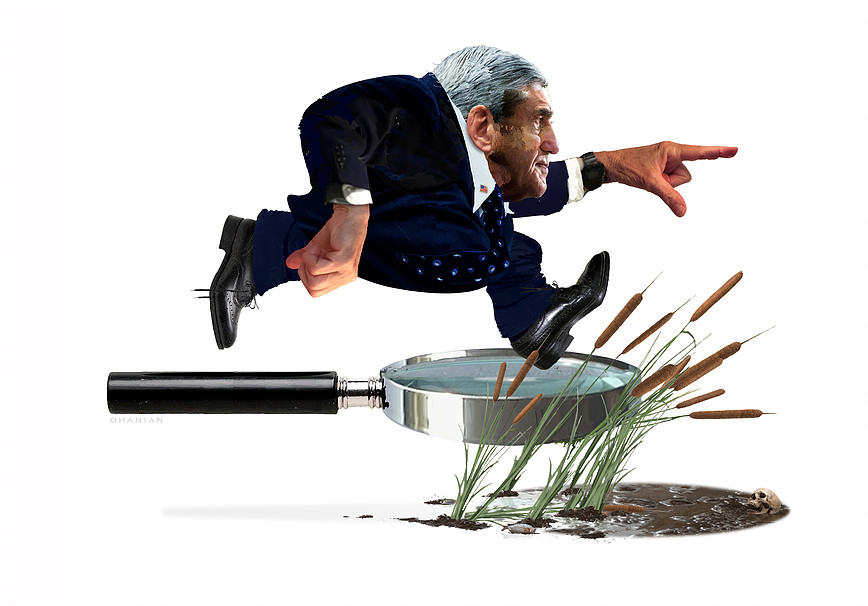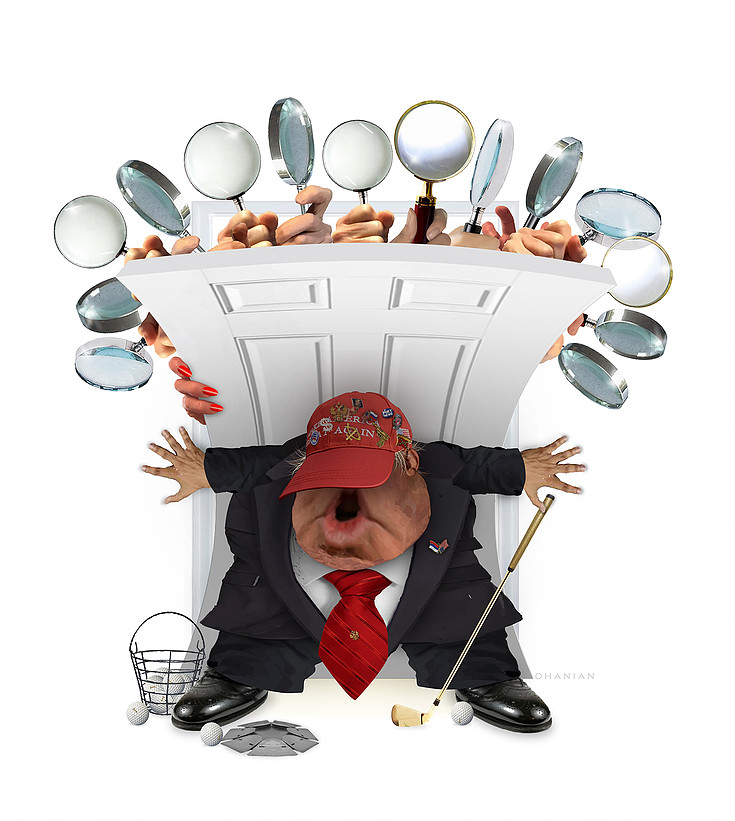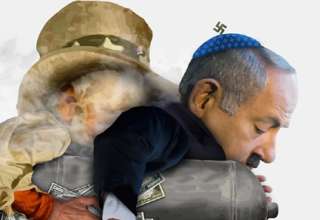
I don’t want to genuflect to Robert Mueller as if his sainthood is imminent. Plenty of others are already busy at that task. Separating him from his legal environment is a challenge, as it’s difficult to ignore a stench floating above many aspects of the US Dept. of Justice. These include ethics matters and a grotesque lack of accountability in an agency where accountability ought to be the most prominent of any agency in government. Indeed, DOJ’s consistency in insulating Wall Street from real consequences for its criminal misdeeds – the revolving door has turned DOJ into a wholly owned subsidiary of Wall Street – could set America up for another financial debacle like 2008. Or worse.

There is no murkier part of Washington’s swamp than at the Department of Justice, where the quicksand gets recycled. Consider the message DOJ sent to potential whistleblowers who might enlighten the public on banksters, prosecuting a very significant whistleblower as a wet kiss to Swiss banks and US subsidiaries who were very generous to the Clintons. Here’s a related item, a recent glimpse of the swamp’s revolving door, about a DOJ lawyer – prominent in the whistleblower travesty – now in the service of Paul Manafort. So I’ve come to view DOJ with a jaundiced eye. That was underway well before the current weasel was put in charge, a sugar magnolia eccentric whose latest itch is to rev up the death penalty, miscarriages of justice be damned.
Mueller has had a worrisome intersection with entrapment. Here’s a first-hand account from a credible source, author and civil liberties lawyer Harvey Silverglate, whom Mueller tried to entrap when Silverglate was a defense lawyer opposing Mueller on a Federal criminal case. Without solid grounds for such an effort by Mueller, that’s troubling in so many ways. An abbreviated version of Silverglate’s account, and a related radio interview, is here. It includes an experience indicating Mueller might willingly avert his eyes from prosecutorial misconduct done in the service of framing a man. Silverglate’s takeaway impression of Mueller, whom he’d known since Harvard Law School, became that of the Grand Inquisitor.
So I was prepared to entertain the worst when an email from the conservative legal hatchet Judicial Watch touted a statement by lawyer and former Harvard law prof Alan Dershowitz implying that Mueller had been complicit in keeping innocent men in prison to protect an FBI informant, the murderous organized crime figure Whitey Bulger. Dershowitz strikes me as something of a mixed bag, but his statement was so startling one can’t ignore it. “Harvard Law professor Alan Dershowitz: ‘I think Mueller is a zealot. Look, he’s the guy who kept four innocent people in prison for many years in order to protect the cover of Whitey Bulger as an FBI informer. Those of us in Boston don’t have such a high regard for Mueller because we remember this story.’” The statement came from this April 8th segment on The Cats Roundtable Show, a radio show hosted by billionaire businessman John Catsimatidis.
There’s been a number of good books written about Whitey Bulger, a moral cretin but colorful enough to merit Johnny Depp playing him in the film Black Mass. Curious as to if Dershowitz’s statement had the ring of truth or was just ring around the collar, I sent a note to the authors of one of the best regarded books, “Whitey Bulger: America’s Most Wanted Gangster and the Manhunt That Brought Him to Justice,” Boston Globe reporters Shelly Murphy and Kevin Cullen, asking what they thought of the allegation of Mueller letting innocent people rot in prison to protect Bulger. Ms. Murphy sent me a piece on the topic she had just completed:
How do Hannity’s attempts to link Mueller to ‘Whitey’ Bulger hold up?
Ms. Murphy’s analysis, to which reporter Martin Finucane contributed, follows below:
Fox News host Sean Hannity, an ardent critic of Robert Mueller’s investigation into whether President Trump’s campaign colluded with Russia to influence the 2016 election, has recently cast aspersions on Mueller’s tenure as a federal prosecutor in Boston decades ago.
Hannity has tried to link Mueller to New England’s most notorious organized crime figure: James “Whitey” Bulger. In one segment, Hannity presented a sarcastic chart, dubbed “The Mueller Crime Family?” that listed Bulger as a member.
During one opening monologue this week, Hannity said it doesn’t seem to matter how “rogue” Mueller is. “It doesn’t matter what he did with Whitey Bulger.”
Hannity also said that while Mueller was a prosecutor in Boston, there were “four men, wrongfully imprisoned for decades, framed by an FBI informant and notorious gangster Whitey Bulger, all while Mueller’s office looked the other way.”
“In that case with Whitey Bulger — a $100 million payout and two of the four people died in jail that were put in there and they were innocent,” Hannity added.
So what’s Hannity talking about, and is there any shred of truth to what he said? Here is what we know about Mueller’s record on those matters during his time in Boston.
What involvement did Mueller have with Bulger?
None. Mueller served in the US attorney’s office in Boston from 1982 to 1988, serving as chief of the criminal division, then first assistant US attorney, and later as acting US attorney for more than a year. During that time, Bulger ran a sprawling criminal enterprise and got away with murders because he was a longtime FBI informant who corrupted his handlers. The FBI and the New England Organized Crime Strike Force, a prosecutorial unit that worked independently of the US attorney’s office and reported directly to the Justice Department, used Bulger to build cases against the Mafia and gave him a pass on his own crimes. The FBI’s corrupt relationship with Bulger was exposed after he was indicted on federal racketeering charges in 1995 and became a fugitive. He was captured after 16 years on the run, convicted of 11 murders, and is currently serving a life sentence.
Were four men framed by an FBI informant and wrongfully imprisoned for years, while two died in prison?
Yes, but that informant was not Bulger. Mob hitman-turned-government witness Joseph “The Animal” Barboza was the key witness in a 1968 trial that led to the wrongful convictions of Joseph Salvati, Peter J. Limone, Louis Greco, and Henry Tameleo for the 1965 slaying of a small-time hoodlum named Edward “Teddy” Deegan. Tameleo and Greco died in prison. For years, the men proclaimed their innocence, but members of the FBI, the US attorney’s office, and the Suffolk district attorney’s office vigorously lobbied against clemency for Limone and Salvati throughout the 1980s and 1990s, insisting they were guilty and had ties to the Mafia.
Their case drew new scrutiny after details of the FBI’s corrupt relationship with Bulger and his sidekick, Stephen “The Rifleman” Flemmi, began to emerge in 1998, triggering a Justice Department investigation and a congressional inquiry into the agency’s mishandling of informants dating to the 1960s. In 2000, a Justice Department task force uncovered secret FBI documents indicating that Barboza framed the four men, while protecting one of the real killers — the brother of the FBI’s star informant, Flemmi. Limone was freed in 2001 after spending 33 years in prison, and Salvati was pardoned four years earlier. They sued the government, alleging the FBI framed them.
Did Mueller know the four men had been wrongly convicted and look the other way?
There’s nothing linking Mueller to that case, according to several attorneys for the men, voluminous court records, and a former federal judge who presided over their wrongful imprisonment trial. In 2007, then US District Judge Nancy Gertner found that the FBI deliberately withheld evidence that the four men were innocent and that the bureau helped cover up the injustice for decades. She ordered the government to pay the men and their families $101.7 million. Gertner, who heard 22 days of testimony and waded through thousands of documents, found the FBI developed Barboza as a witness and turned him over to the state, without disclosing the agency’s documents that indicated he was lying.
“Absolutely nothing in the record that I saw suggested Mueller’s involvement in any way in either the initial acts that led to the four men’s imprisonment, or the acts that ended in their continued imprisonment and denying them parole or the coverup,” Gertner said Friday. “To suggest otherwise, in my view, is not true.”
Was Mueller among the prosecutors who wrote letters to the Massachusetts parole board opposing the release of the four before evidence emerged that they had been framed?
No, according to both Gertner and Limone’s attorney, Juliane Balliro, who was given certified copies of the parole board records for Limone, Greco, Tameleo, and Salvati before their 2007 trial.
“His signature never appeared on anything I ever saw or can recall,’’ Balliro said. “[Mueller] just wasn’t on the radar screen.”
Former Massachusetts Parole Board member Michael Albano, who complained of intimidation and retaliation by the FBI after he voted in favor of commutation for Limone in 1983, said Thursday that he’s convinced that at one time he saw a letter from Mueller, written in the 1980s, opposing the release of either Limone or one of the other three men.
A 2011 column by the Globe’s Kevin Cullen has been cited in media reports that attempt to link Mueller to the wrongfully imprisoned men. At the time, Cullen said Mueller wrote letters to the parole and pardons board throughout the 1980s opposing clemency for the four men. But, in a recent column, Cullen said he heard that from Albano but did not see any letters from Mueller.
The day in 2007 that Gertner announced that the FBI was “responsible for the framing of four innocent men” and awarded the multimillion judgment, Mueller, then the FBI director, was being questioned during an FBI oversight hearing in Washington, DC He characterized the case as a debacle and said, “I would suggest to you that that is isolated. Day in and day out over the years, FBI agents have been undertaking investigations and done them lawfully.”

I should note that Kevin Cullen also wrote a piece on Friday that included some comments on Mueller and the Bulger era that seem more ambivalent about Mueller’s role, or at least Mueller’s responsibility to be more knowledgeable as to what was going on when he was in Boston’s US Attorney’s office during the Bulger saga, in various capacities including acting US Attorney.
Even though the FBI and the prosecutorial unit involved in the coverup of wrongful convictions reported directly to the Justice Department, one does wonder why the local head cheese didn’t know more of any miscarriage of justice on his turf, particularly related to a high-profile character like Barboza.
I believe cautions on Mueller such as that by Silverglate, author of Three Felonies a Day, How the Feds Target the Innocent are worth staying mindful of as Washington’s reality circus parades forth.
But on the matter of whether Mueller was a creep who let innocent men rot on behalf of Bulger, I’m deferring to the reporting of Whitey Bulger expert Shelly Murphy and to the assessment of then US District Judge Nancy Gertner, quoted in Ms. Murphy’s article above. As to Hannity’s credibility and his ready twist-up with a different cast of characters, well, what’s the point?
If Alan Dershowitz has evidence to the contrary, I encourage him to get in touch so we can present it in this happy-go-lucky forum.
However Mueller’s investigations sort out, the long-term harm from the jaw-dropping venality of the Trump Administration is where the country’s prime focus ought to be.
Whatever tactics Mueller pursues, they’d better prove better than a prosecutorial gotcha card like that played on Bill Clinton over a personal sexcapades scandal, or he might make Trump a more sympathetic character than he deserves.
A personal aside on DOJ: I saw up close how laughable DOJ’s Office of Professional Responsibility is when I tried for some measure of accountability for a self-serving US Trustee who made a disgusting mockery of the concept of trust. That’s a digression I won’t go into now, other than to note the OPR is colorfully described as a Roach Motel – complaints check in but they don’t check out. That doesn’t inspire confidence.
If Mueller sticks around, I hope he isn’t dragged down by the agency culture that surrounds him.
That culture comment isn’t a broadside at government employees, at least the majority who haven’t tumbled to minions status or are looking for lucrative passage through the revolving door. I’ve done stints in bureaucracies, including legal at an agency with a liberal image as Ronald Reagan’s wrecking crew came calling. I understand what those serious about serving the public are up against, and wish them better luck persevering than I had. And I hope some find reliable backchannels if in the mood to blow whistles, even quietly. The comment is about those who cultivate cultures where anything goes to justify the end, or to give a pass to the well-connected, or to simply muddy the waters of accountability. They’re a fraction, but a well-placed fraction.







 Growing up in Kansas, Skip Kaltenheuser was tuned to travel by a traveling salesman father’s pedal to the metal vacations. He extended his reach with travel writing, and efforts such as supervising elections and doing special projects. When they’re willing to slum with him, Skip’s favorite travels are still with one or both kids, now young adults, neither indicted despite living in Washington, DC their entire lives.
Growing up in Kansas, Skip Kaltenheuser was tuned to travel by a traveling salesman father’s pedal to the metal vacations. He extended his reach with travel writing, and efforts such as supervising elections and doing special projects. When they’re willing to slum with him, Skip’s favorite travels are still with one or both kids, now young adults, neither indicted despite living in Washington, DC their entire lives.













